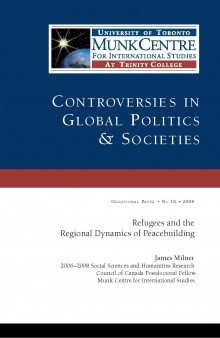By James Milner
The establishment of the UN Peacebuilding Commission in 2005 is but one example of recent developments in the concept and practice of “peacebuilding.” While many of these developments have been encouraging, they share a common limitation: they are focused almost exclusively on activities within the country in question, with little or no attention paid to the regional nature of conflicts and the impact of these dynamics on peacebuilding. This paper considers the regional dynamics of peacebuilding by examining the relationship between protracted refugee situations and regional insecurity, especially in West and Central Africa. The paper argues that the presence of “spoilers” in refugee-populated areas and the potential for early and forced refugee repatriation have the potential to undermine peacebuilding efforts, while the experience of exile may enable refugees to contribute to various stages of the peacebuilding process. The paper concludes by arguing for a broadening of peacebuilding research, policy, and practice, especially in the work of the UN Peacebuilding Commission, to incorporate a response to these broader regional dynamics.
